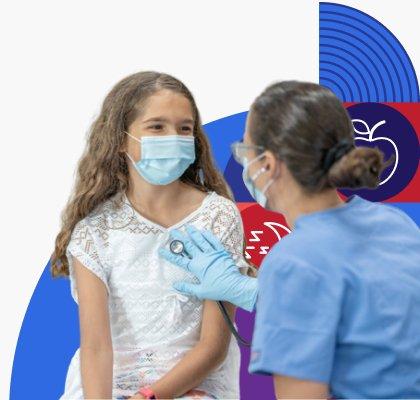Doctor Visits
Make the Most of Your Child’s Visit to the Doctor (Ages 11 to 14 Years)

The Basics
Overview
Kids ages 11 to 14 years need to see the doctor or nurse for a “well-child visit” once a year.
A well-child visit (also called a checkup) is when you take your child to the doctor to make sure they’re healthy and developing normally. This is different from visits for sickness or injury.
At a well-child visit, the doctor or nurse can help catch any problems early, when they may be easier to treat. You’ll also have a chance to ask any questions you may have about your child’s behavior or development.
Learn what to expect so you can make the most of each visit.
Child Development
How do I know if my child is growing and developing on schedule?
Your child’s doctor or nurse can help you identify “developmental milestones,” or signs that show your child is developing normally. This is an important part of the well-child visit.
Some developmental milestones are related to your child’s behavior and learning, and others are about physical changes in your child’s body.
See a complete list of developmental milestones for kids who are:
Behavior Changes
What are some changes I might see in my child’s feelings, relationships, and behavior?
Developmental milestones for kids ages 11 to 14 years include:
- Developing stronger problem-solving skills
- Developing a clearer sense of right and wrong
- Wanting more independence and privacy
- Having mood swings (going quickly from happy to sad or sad to happy)
- Showing more interest in friendships and classmates
- Beginning to think more independently (for example, wanting to understand the reasons behind parents’ decisions or school rules)
This is also a time when some kids may start showing signs of depression or eating disorders. Bullying and social media use may also become issues at this age. It’s important to:
Physical Changes
What physical changes will my child go through?
Many kids ages 11 to 14 years are going through puberty. Puberty is when a child’s body develops into an adult’s body.
Puberty can be a difficult time for gender-diverse children — kids who feel that they’re a different gender than the sex that’s listed on their birth certificate. Encourage your child to talk with you or their doctor if they have questions about their gender. Find tips for parenting a gender-diverse child.
Puberty usually starts:
- For girls: between ages 8 and 15 years. Get more information about puberty to share with your daughter.
- For boys: between ages 9 and 16 years. Get more information about puberty to share with your son.
You can help by giving your child information about what changes to expect during puberty. You can also encourage your child to talk about puberty with the doctor or another trusted adult, like a teacher or school nurse.
Take Action
Get Ready
Take these steps to help you and your child get the most out of well-child visits.
Gather important information.
Take any medical records you have to the appointment, including a record of vaccines (shots) your child has received. If your child gets special services at school because of a health condition or disability, bring that paperwork, too.
Make a list of any important changes in your child’s life since the last visit, like a:
- New brother or sister
- Separation or divorce — or a parent spending time in jail or prison
- New school or a move to a new neighborhood
- Serious illness or death of a friend or family member
Use this tool to keep track of your child’s family health history. This information will help your doctor or nurse know if your child is at risk for certain health problems.
Help your child get more involved in doctor visits.
Once your child starts puberty, the doctor will usually ask you to leave the room for a few minutes so your child can ask questions about their health. This lets your child develop a relationship with the doctor or nurse, and it's an important step in helping your child learn about their health care.
Your child can also:
- Call to schedule appointments (you can check to see if the doctor’s office allows this)
- Help you fill out medical forms
- Write down questions for the doctor or nurse
For more ideas, check out these tips to help your child take charge of their health care. You can also share this list of questions for the doctor with your child.
What about cost?
Under the Affordable Care Act, insurance plans must cover well-child visits. Depending on your insurance plan, you may be able to get well-child visits at no cost to you. Check with your insurance company to find out more.
Your child may also qualify for free or low-cost health insurance through Medicaid or the Children’s Health Insurance Program (CHIP). Learn about coverage options for your family.
If you don’t have insurance, you may still be able to get free or low-cost well-child visits. Find a health center near you and ask about well-child visits.
To learn more, check out these resources:
Ask Questions
Make a list of questions you want to ask the doctor.
Before the well-child visit, write down a few questions you have — and ask your child if they have any questions to add. This visit is a great time to ask the doctor or nurse any questions about:
- A health condition your child has (like an allergy, asthma, or acne)
- Changes in behavior or mood
- Loss of interest in favorite activities
- Strengths and challenges at school (like learning challenges or not feeling safe at school)
Here are some questions you may want to ask:
- How can I make sure my child is getting enough physical activity?
- How can I help my child eat healthy?
- Is my child at a healthy weight?
- Is my child's body developing normally?
- Is my child up to date on vaccines?
- How can I help my child succeed at school?
You may also want to ask for guidance on talking to your child about sensitive subjects. You can ask:
- How can I talk with my child about sex?
- How can I talk with my child about tobacco, alcohol, and drugs?
- How can I teach my child to use the internet safely?
- How can I talk with my child about bullying?
- How can I talk with my child about racism and racial bias?
Take notes so you can remember the answers later.
Find more tips to talk to your child about a range of tricky topics.
Ask what to do if your child gets sick.
- Make sure you know how to get in touch with a doctor or nurse when the office is closed.
- Ask how to reach the doctor on call, or if there's a nurse information service you can call at night or on the weekend.
What to Expect
Know what to expect.
During each well-child visit, the doctor or nurse will ask you questions, do a physical exam, and update your child’s medical history. You'll also be able to ask your questions and discuss any problems.
The doctor or nurse will ask you and your child questions.
The doctor or nurse may ask about:
- Behavior: Does your child have trouble following directions at home or at school?
- Health: Does your child often complain of headaches or other pain? How much sleep does your child get? When was their last visit to the dentist?
- Safety: Does anyone in your home have a gun? If so, is it unloaded and locked in a place where your child can’t get it?
- School and activities: Does your child look forward to going to school? What does your child like to do outside of school?
- Eating habits: What does your child eat on a normal day?
- Family and friends: Have there been any recent changes in your family? How many close friends does your child have? Has your child been bullied at school or online?
- Emotions: Does your child often seem sad, stressed, or bored? Do they seem scared or worried a lot? Does your child have someone to talk to about problems?
- Sexuality: Have you talked with your child about puberty? Is your child dating?
The answers to questions like these will help the doctor or nurse make sure your child is healthy, safe, and developing normally. Be honest, even if you’re worried you’re doing something wrong — the doctor or nurse is there to help you.
Physical Exam
The doctor or nurse will also check your child’s body.
To check your child’s body, the doctor or nurse will:
- Measure height and weight
- Check your child’s blood pressure
- Check your child’s vision and hearing
- Check your child’s body parts
- Decide if your child needs any lab tests, like a blood test
- Give your child any vaccines they need
Learn more about your child’s health care:
Behavior and Emotions
The doctor or nurse will ask how your child is doing — and pay special attention to signs of certain issues.
The doctor or nurse may ask your child if they:
- Enjoy school
- Have friends
- Can talk to a caring adult
- Feel sad or anxious
- Worry about their weight
- Use tobacco, alcohol, or drugs
- Experience any kind of violence
The doctor or nurse will offer additional help if your child has any signs of needing more support.
And if your child may be having sex, the doctor or nurse will talk to your child about preventing STIs (sexually transmitted infections, also called sexually transmitted diseases) and pregnancy. Learn how to talk with your child about preventing STIs.
The doctor or nurse will make sure you and your child have the resources you need.
This may include telling you and your child about:
- Websites or apps that have helpful health information
- Organizations in your community where you can go for help
If needed, the doctor or nurse may also refer your child to a specialist.
Content last updated July 10, 2024
Reviewer Information
This information on well-child visits was adapted from materials from the Centers for Disease Control and Prevention and the National Institutes of Health.
Reviewed by:
Sara Kinsman, MD, PhD
Director, Division of Child, Adolescent, and Family Health
Maternal and Child Health Bureau
Health Resources and Services Administration (HRSA)


